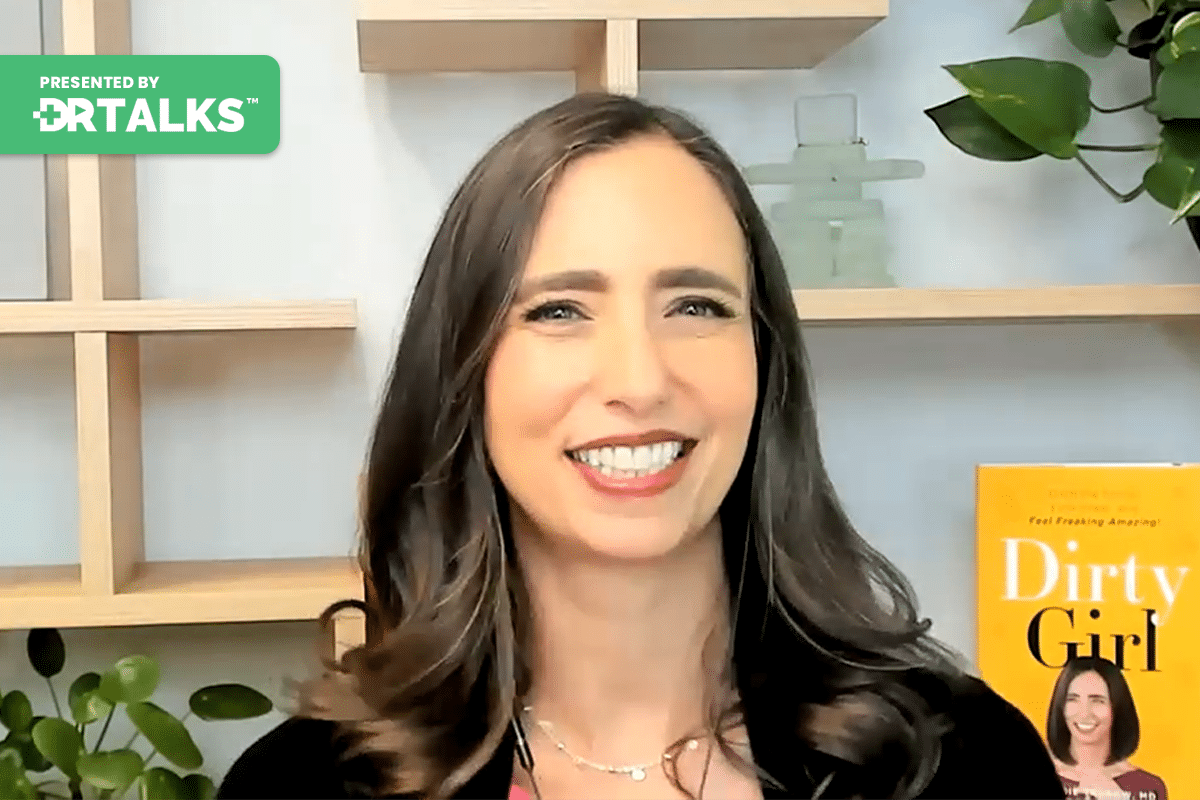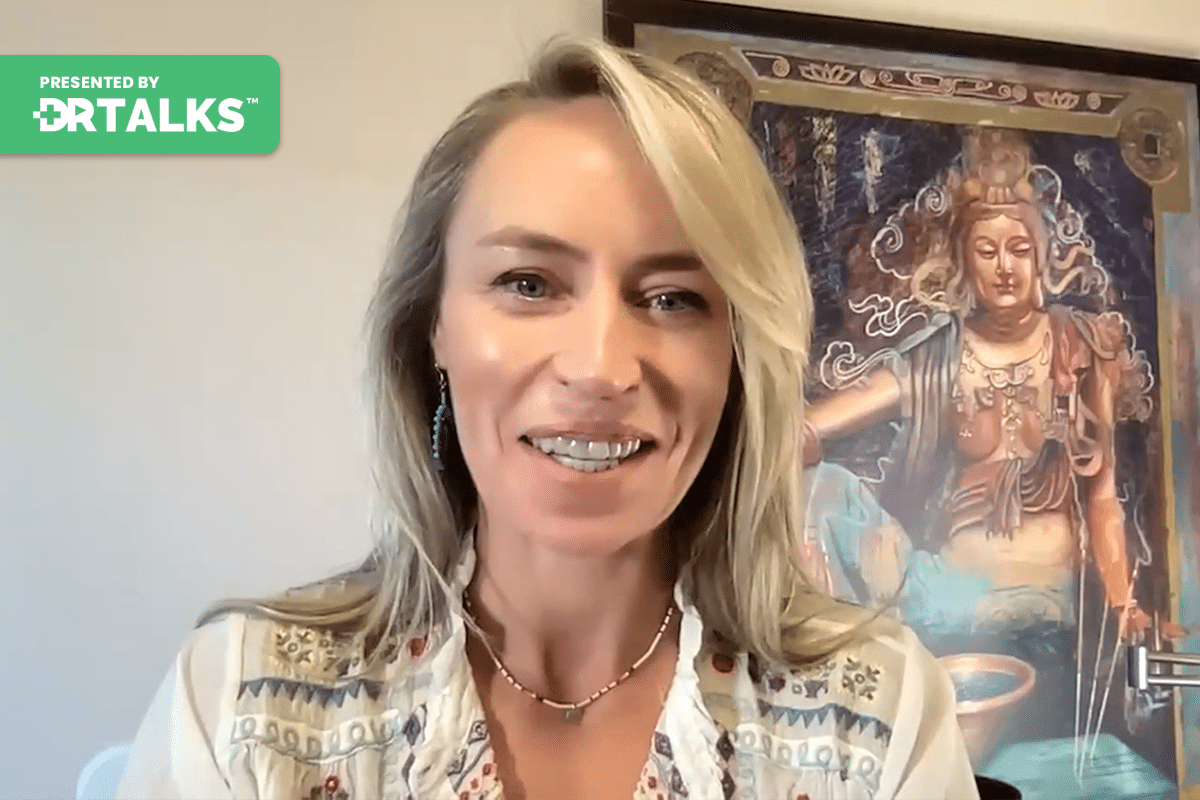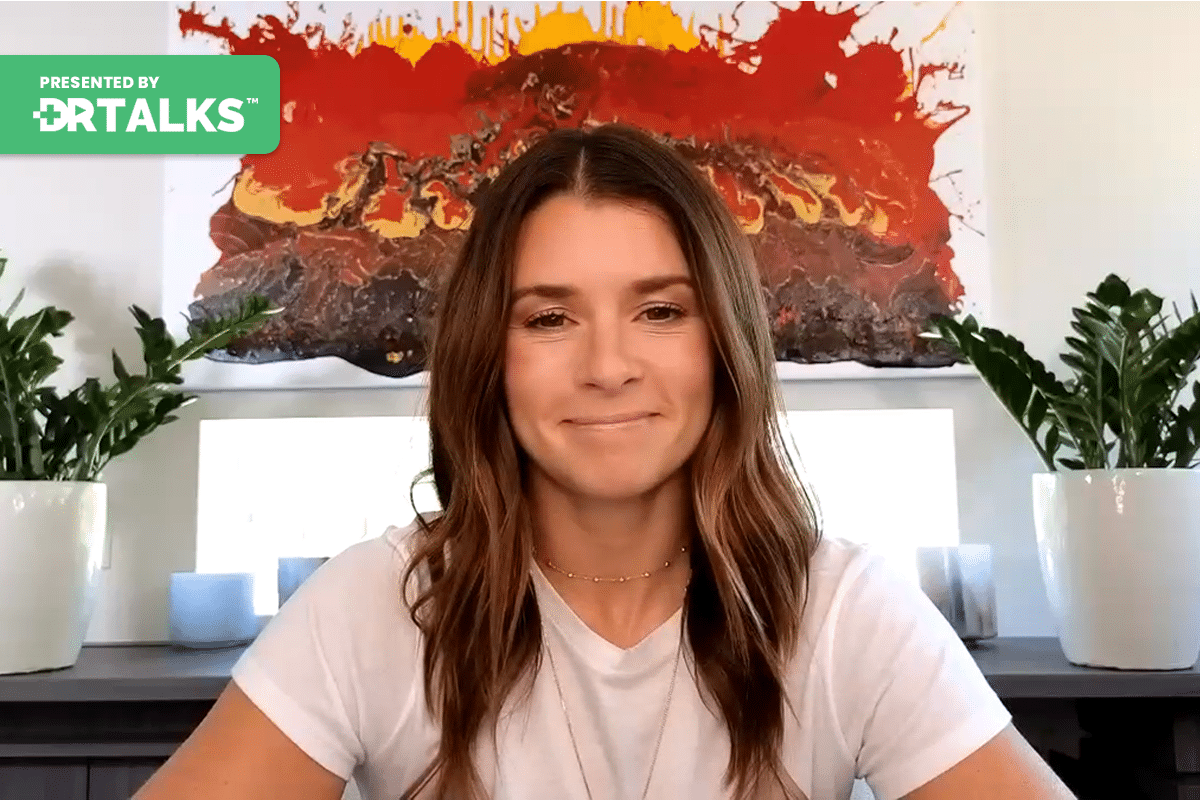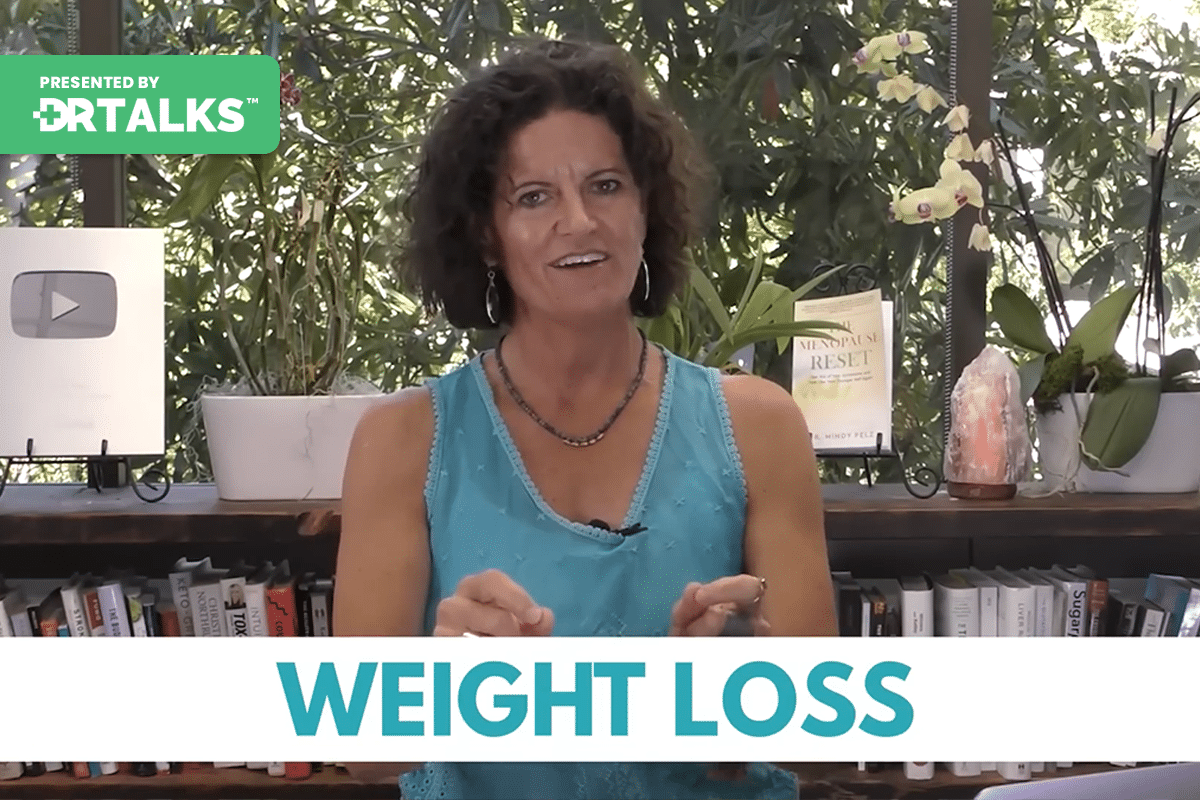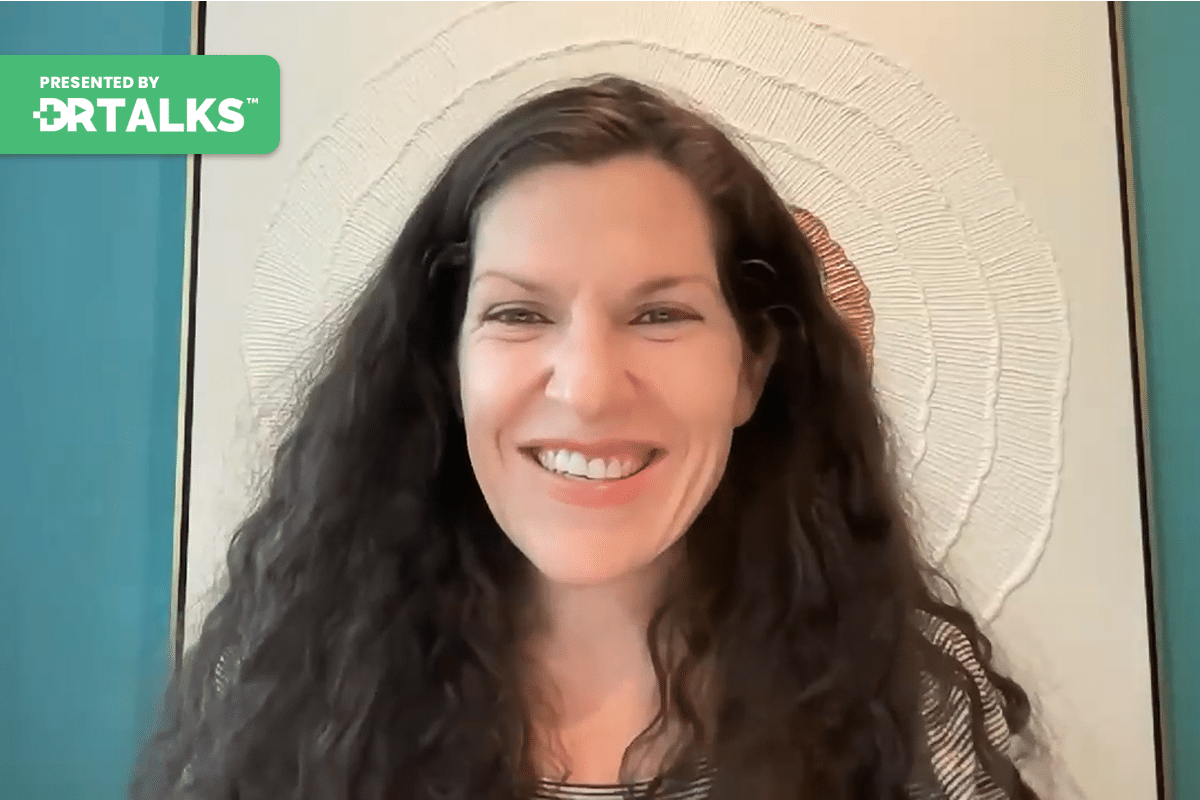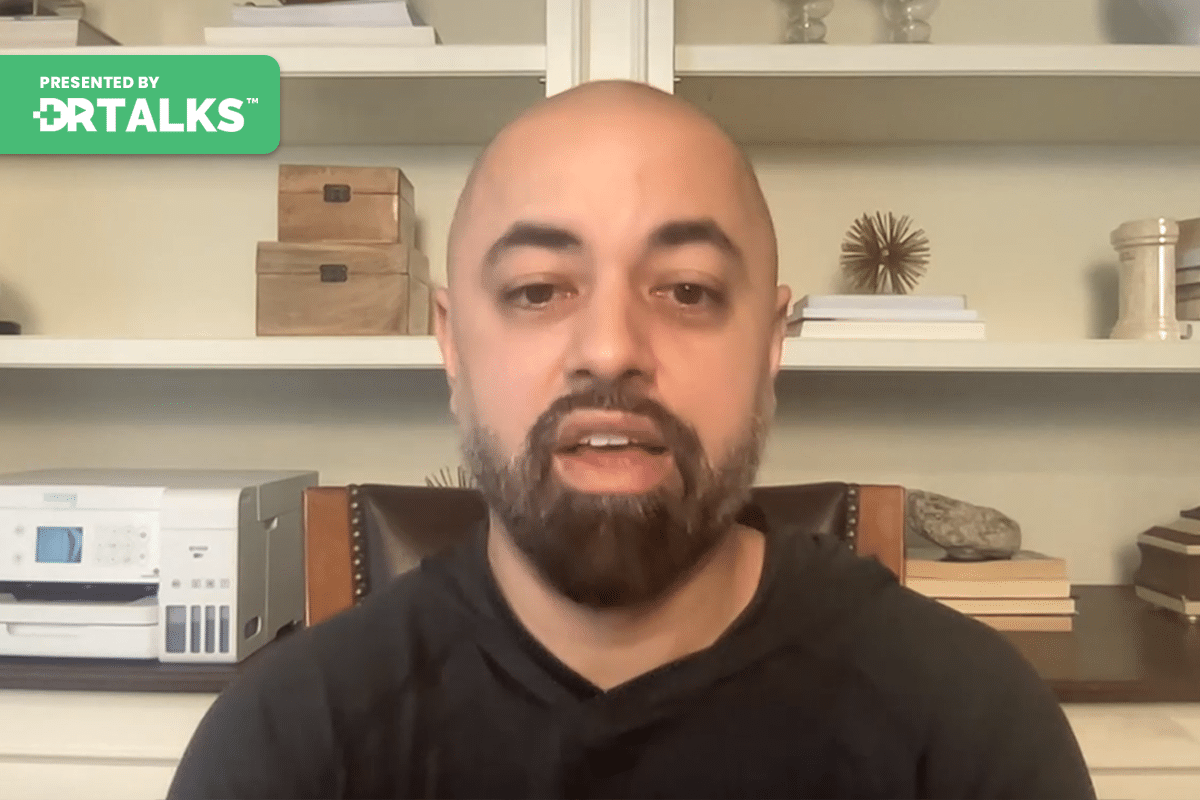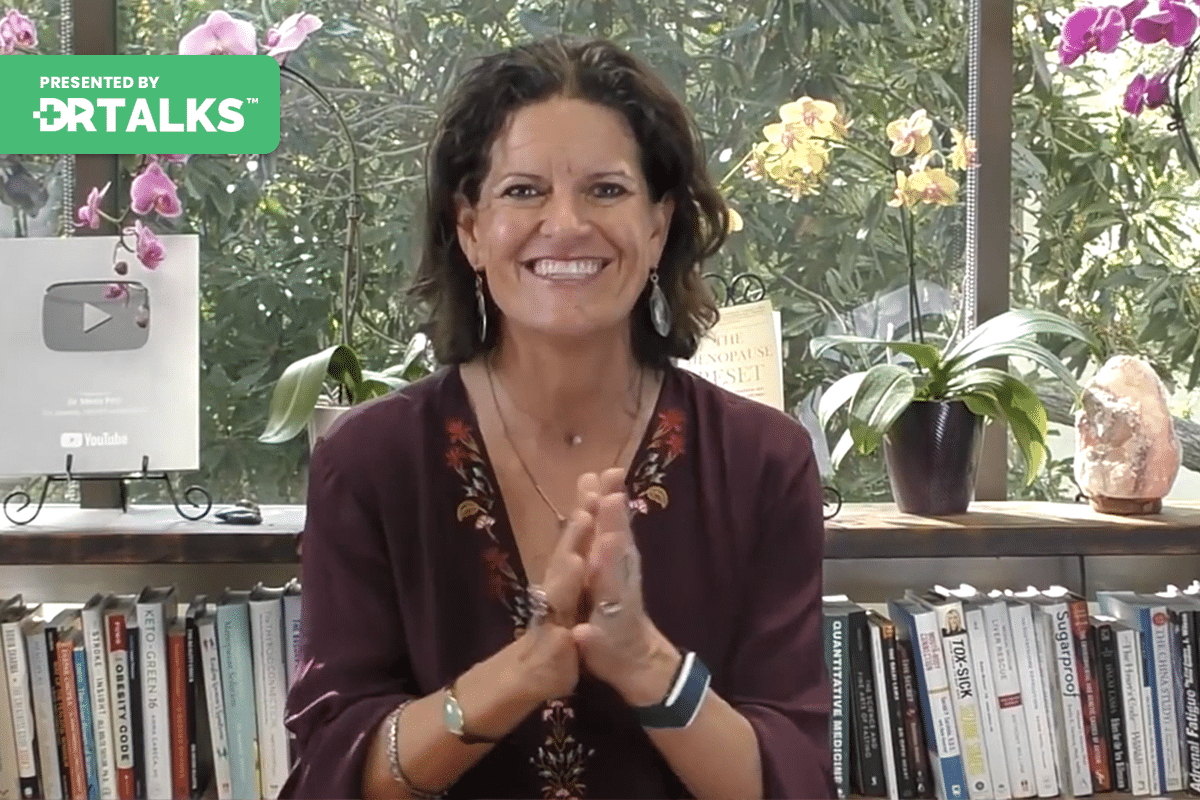Join the discussion below

Kashif Khan is the Chief Executive Officer and Founder of The DNA Company, where personalized medicine is being pioneered through unique insights into the human genome. With the largest study of its kind globally, The DNA Company has developed a functional approach to genomic interpretation overlaying environment, nutrition, and lifestyle... Read More

Wendie Trubow, MD, MBA, IFMCP is a functional medicine gynecologist with a thriving practice at Five Journeys, and is passionate about helping women optimize their health and lives. Through her struggles with mold and metal toxicity, Celiac disease, and other health issues, Dr. Trubow has developed a deep sense of... Read More
- Unravel the multitude of ways toxins are affecting our health, including weight gain, menopause, and sleep, and take informed steps towards detoxification
- Learn about low-hanging interventions that can significantly improve your health by minimizing the impact of toxins
- Equip yourself with the knowledge to discern and control the toxic overload in your environment and body, for a revitalized and healthy life
- This video is part of the Fast Like a Girl Summit
Kashif Khan
Welcome back, everybody. We are going to dive deep into the big threat, the toxic overload. You’ve been hearing it all these different times, whether we’re talking about menopause, the menstrual cycle, or whatever. What it comes back to is that there’s this thing that we have to deal with now that wasn’t a problem for Grandma. It’s now something that you have to know about it if you’re like me and Wendie Trubow, who’s joining us today. You’ll see a book called Dirty Girl, which is what we’re all dealing with. We’re going to unpack that a little bit. Thank you for joining us.
Wendie Trubow, MD, MBA, IFMCP
My pleasure. Great to be here. This is one of my favorite topics.
Kashif Khan
Yeah, for sure. You’ve done a good job explaining it to the world. Your book is help with that. There’s so much to cover. First of all I know you have a personal story around this and that drove you in this direction. Maybe you can enlighten us because that’s really powerful in terms of why you’re here.
Wendie Trubow, MD, MBA, IFMCP
Yeah, my mess absolutely became my message, no question. I’m going to ignore the first part of my life. I’m going to fast forward from birth to 48. However, in that fast forwarding, we’re going to just touch on that I was born with what I consider to be the world’s worst genes. Actually at my party in December, I sat my parents down. They’re divorced. But they get along and they’re chatting at the table. I sat them down and I said, look, I’m really grateful you reproduced, but you shouldn’t have, because I have two copies of the MTHFR gene, I have two copies of vitamin D deficiency, I have two copies of the celiac gene, one copy of the serum T, and it goes on and on. Fast forwarding through the 48 years, I developed celiac, I developed severe nutritional deficiencies, I had an irritable gut. But fast forward to 48, I already knew all that. I’ve been working really hard on my health for let’s think about this. When I was 35 was when I really started working on my health because that’s when I was diagnosed with celiac. Fast forward to 48. I feel pretty darn good. My guts are quieter. I still don’t eat gluten because I have celiac, but the nutritional deficiencies are gone. My hair has started to grow back. My anxiety is gone. My heart palpitations are gone. I’ve been able to gain weight again. Here we go to the other direction. I come back from the trip of a lifetime. We went to France and spent a week right in the center. My kids still talk about it today. They’re like, Can we go back? I’m like, Well, maybe, we’ll see. There’s a lot of places to see in the world. Anyway, I come back from this trip and the month after I come back, I gained 9 pounds. Half the hair on my head falls out and I have this rash on my face. It was, like I wanted to rip my face off. Most days. It was on my eyelids, corners of my eyes, right around my nose and under my lip. It was itchy, like crazy.
Nothing made a difference. I didn’t really want to put a steroid cream on it because it’s such sensitive tissue. I just used a lot of makeup and was like, okay, not to touch my face, but I was no longer in the I want to gain weight phase because I was wasting. Gaining nine pounds was not cool. My first thought when any human, particularly a female human, gains weight, the first thought is my thyroid must be out of whack. That’s a human history. I check my thyroid and it’s perfect. Then I’m 48, so I’m like, it must be my hormones. My hormones are perfect and I’m really stumped. You got to go to the gut. Everything starts in the gut. Okay, so I do a stool test and I have celiac and I had Candida and I dysbiosis when I first got into this game and now I was like, okay, there’s no inflammation, there’s no dysbiosis. My digestion is pretty good. It’s not my gut. Now. I’m totally stumped. Fast forward a few months and I’m listening to the radio and I hear that when Notre Dame burned, 500 tons of lead dust was released into the air. The closer you were to Notre Dame, the more exposure you got and the further you were, the less exposure that makes sense. The epicenter was at Notre Dame, I guess, when we were in France. We were in France the week after Notre Dame burned.
Kashif Khan
Oh, man.
Wendie Trubow, MD, MBA, IFMCP
I know. I already knew that. I had a lead exposure from my neighbor taking his postwar house down. He took it down and built another house and it was the dead of summer and it was dusty as all get out and I was like, shut the windows, no air conditioning. My family thought I was nuts, but I was like, That’s a lead house because we had it also. I already knew I had this lead exposure in like September of 2018, and then I had this other lead exposure in April of 2019, and then I went off the cliff and my hair and sort of started to thin over that year. But it really I went off the cliff and I looked at my husband. We heard that radio report. We all got a lead exposure, but for me, it was enough to tip me over. It was the straw that broke the camel’s back. My body couldn’t deal with anymore and my cup was full. I did an evaluation and I have access to all this stuff. I did the evaluation and I found that my lead level was 25% higher than it had been the last time I did it a few years before and a few years before, it had been just slightly positive and not knowing then what I know now, I blew it off. I was like just a little bit high. Like, it’s fine. Not really knowing as much as I know now, I shouldn’t have blown that off because it left me with no reserve when I got another lead exposure or two let exposures. I started treating. But there’s more. I also did the testing for Mycotoxins and part of this MTHFR the reason it’s important is I’m a crappy detox are just not a good Methylator detox and so not only did I have the lead, but I also had five strains of Mycotoxins. There’s more because then I did the environmental toxins, like gasoline fumes, nail polish. You’ll notice my nails are not done. Phthalates, plastics, perchlorate, flame retardants. I was positive for a long list of them. I didn’t have glyphosate that the one thing that wasn’t positive, but I got all this testing and a kind of reconciling it and I was like, Oh, I’m such a dirty girl. I was like, that’s the book we need to write because I have worked my tail off for the last now 17 years to really transform my health and feel freaking amazing and get rid of everything and eat organic and do all the right stuff and I have all these toxins. If I’m doing everything right, what does everyone else have who may not be as far along the path as I am? That’s why we wrote the book. But it really has become my passion because we’re drowning in a waterfall of toxins that are making us sick.
Kashif Khan
Yeah. That’s that one. When you experience, you were doing everything right. Everything is textbook.
Wendie Trubow, MD, MBA, IFMCP
Except for detox.
Kashif Khan
Except for detox. You weren’t directly set up so that not only was your methylation off, but also your comt was a little slower. It’s like, okay, even the little methylation you were doing, there’s no door open to send that stuff out. Double whammy there. This silent threat of environmental health, which is a new concern, meaning that it’s a layer of health that we didn’t know we needed, that we now need.
Wendie Trubow, MD, MBA, IFMCP
Right. Because I think we need to talk about that it’s not so silent because when you look at disease as a grouping and obviously this is the Fast Like the Girl Summit. But let’s talk sort of big picture because everyone knows someone who has had cancer or diabetes or heart disease or metabolic disease or obesity. But those are not just for women. Those are for everyone. And toxins underpin them because toxins are so inflammatory. They set the stage for that cascade of disease to start up.
Kashif Khan
Yeah. Then when you’re not equipped to deal with them, so you have your household and one family member feels worse than everyone else and there’s a genetic underpinning there. And you wonder why does this stuff seem to affect women more aggressively to the same slow comt that is preventing you from dealing with these toxins also makes you hold onto your toxic hormone metabolites. You also need that comt to clear that. There’s, again, additional threat that we would have to deal with. The same thing that’s going to make you sick from toxins is also going to not be able to deal with your internal toxins. It ends up being exponential.
Wendie Trubow, MD, MBA, IFMCP
Then and then you layer on as women, by the time we’ve left the house, we’re exposed to 150 to 250 chemicals. Those chemicals are coming in the form of our beauty products, particularly with phthalates. If you’re buying something that’s made in another country and they don’t have the strictest oversight that can also be contaminated with heavy metals. You’re getting exposure with your face, your makeup. What do we use? We use cover up, eyeliner, eye shadow, brow thickener, brow gel, mascara. Then we use base and foundation and then we use lipstick. I mean, there’s like ten, 12 different products and then we do our hair with products and then we put on our dry-cleaned clothes and all of those become endocrine disruptors. Like you mentioned, if your genetics are not optimized, when you go to get rid of those toxins and those endocrine disruptors, they just build up. That makes us fat not to be NPCs. Like that makes us retain weight in our least favorite areas, right under our arms, belly, butt, inner thigh.
Kashif Khan
Yeah. We’re walking around in this toxic suit. It’s a toxic uniform. Just recently, a couple of months ago, there was news around Johnson and Johnson agreeing to pay out some, I think eight billion dollars because of baby powder, which is the worst place to find this stuff because of talc. You think, well, what’s wrong with talc? Well, talc is mined right next to asbestos. The reason I bring that up is just to speak to the sort of quality control that’s out there. You can’t rely you see a big brand, you see a store, you can’t. That’s not your sort of trigger of safety just because it’s been vetted and put on the shelf. Because when you’re that big and you’re making it in that volume and you’re trying to mine talc from where it neighbors asbestos. This is true for all of these mass produced packaged products. You have to just think a little carefully. Why then you said, okay, wait in all the wrong places. What’s the trigger there? What’s the mechanism? Why does it lead to weight gain?
Wendie Trubow, MD, MBA, IFMCP
Great question. Your liver is viewed, your adrenals, your liver, and your gut are designed to keep you in balance. Okay. There’s a number of places where processing your hormones from proper to improper can go wrong. Start with you have stress, everybody has stress, right? We’re all stressed. We wake up stressed and then we spend our days stressed. But when you’re stressed, the adrenals signal the liver and the gut. It’s not time to detox people. It’s time to survive. When you’re surviving, you’re focusing on getting glucose to your big running muscles. You are not focusing on liver detoxing because instead it’s removing the glycogen stores so it can turn into glucose and you’re not focusing on digestion. Okay, so that’s point one, where things go wrong, you shut the system down with stress. Point two: imagine you weren’t exposed to any of these chemicals, even the word drowning in them. Your body is designed to take your hormones through two phases in your liver. Phase one is very rapid. It creates a toxic intermediate. That’s a free radical. Phase two is a little bit slower, but that’s where that free radical is taken from being fat soluble into water soluble so that you can most of the time poop it out, but you can also pee it out. Now if at any point in that process you go into a stressed state and you signal the liver, hey, stop the process, we’re being chased by a lion. We cannot do this. You stop processing your hormones now. It’s now a toxic intermediate, and your body knows that it’s a free radical. You’re going to store it because it’s fat soluble. You store it in your fat, your organs, your brain, which is highly lipophilic fat loving. In a normal situation, when you start with stress, you can interrupt the process. In an ideal world, you go through phase one, you go to phase two, you bind it and you put it in your gut and you’re going to poop it out. Now, the next place it can go wrong is if you have dysbiosis or if you have inappropriate excretion of this enzyme called beta glucanases is a terrible thing to type in a note, I have to tell you, I type it all the time and I’m like, I really should have a dot phrase for this. It’s automatic, but it’s an enzyme that takes that bound, water soluble hormone and separates it.
Now you have remember, you’re free radical that is fat soluble, not water soluble. If anyone’s ever made salad dressing that your lemon or your vinegar and your oil don’t mix, they don’t emulsify. Whenever you have now this unbound hormone, it goes back in your circulation, your liver has to deal with it again. There’s a lot of places this can go wrong. Now, pile on that you’re getting exposed to these toxic endocrine disruptors. They’re called endocrine disruptors because they look like the rest of your hormones. They bind like the rest of your hormones. They act like your hormones, and you have to process them like your hormones. Now the liver is like cheese. I’ve got your own endogenous hormones to deal with my endogenous hormones. I’m getting deluged with all of these other sources of phthalates and endocrine disruptors that are now even more work for the liver to do. The liver just gets overloaded. When the liver gets overloaded, it does what it can do and it stores the rest in its storage depot, which is fat. That’s why we gain weight. We often gain it in our bellies, our butts, that’s where we pack it on. Belly fat in particular is very inflammatory.
Kashif Khan
People and you get stuck in this loop of yep calories and treadmill. Right, right. There’s a whole other problem you’re not even addressing. That’s a problem in itself because you have toxins and estrogens trapped in your fat and you are in this loop of making more than you’re on your treadmill, burning them, and you’re really releasing them back into the system as you’re killing off fat cells. You have to understand the why behind anything and we only look at things that are very sort of our recreational level, base level. But there’s so much more and so many more.
Wendie Trubow, MD, MBA, IFMCP
Totally. Right. Like people will come and sit in my chair as a patient and say, Doc, I have a hormone level my call it’s fix your gut like what does that have to do with anything? I’m like, here’s why it matters. The whole thing we just talk about because your gut will thank you or top you off. It just depends.
Kashif Khan
At the beginning, you mentioned all these tests that you used on yourself to determine all of the problems you had. There was many that kept going and going. What are these tests? What should people rely on? Then identify these problems.
Wendie Trubow, MD, MBA, IFMCP
Yeah, I love this. Okay, so let’s start with you. You can know you have a problem if okay, and we’re going to fill in the blank here. You know that you have a problem with toxins. If, A. you live on this earth. That’s pretty much everyone, right, except the astronauts. But they’re getting a different type of different category of toxins with. Yeah. Let’s focus on if you live on this or if you are being exposed in every way to toxins from your air and water quality to the things you’re sitting on. Vegan leather is really big now. Vegan leather, I guess what is made out of plastic? We’re sitting on plastic. We dry cleaner clothes. It has formaldehyde. That’s what they use to preserve you when you die. You’re not actually meant to put formaldehyde on your skin. There’s a lot of ways that you can know that you’re sick. Okay, so, one, you’re exposed because you live on the earth.
Two, you have any type of hormonal dysregulation, meaning heavy, overly heavy periods or really frequent periods, overly infrequent periods, PCOS, metabolic syndrome, bad transitions, adult acne, diabetes, gut dysfunction. Okay. Any of those would signal, oh, hey, I should worry about toxins, but then things like hair loss, we all are like, oh, I’m menopausal, so I’m losing hair. No, you’re losing hair because you’re no longer resilient. That’s how it comes out. I think you asked, how would people know to test? If you don’t feel freaking amazing, you should test. But don’t do it alone. If you’re getting into toxins, you want to make sure your gut is optimized. You want to work with a functional medicine provider so that they really have their eyes on all of you. Because, again, it’s not just little one slice, it’s everything.
Kashif Khan
Yeah. I hear what you’re saying is that we are resilient and we are meant to thrive and we’re meant to be at this sort of homeostatic middle, which is perfect and feel good and the symptom is the signal. That’s your body. Say, hey, please check engine light. Something’s going on and it’s usually an input of some sort. We used to lean on things like stress and sleep and food, which we still do. But now we’re also saying, here’s a big one, that if you’re walking around on this planet as you said, you probably have some level of exposure and it’s something to check. Then where do you, what do you start testing for? Like, are there the usual suspects that you go for first? Or is there like a complete panel or what is it? What are you look at?
Wendie Trubow, MD, MBA, IFMCP
I love this question. Okay. I think of it like a pyramid. At the very base of the pyramid, the foundation of the pyramid is sleep, stress reduction, optimizing your food intake, meaning there’s no eating plan that works for every human. But I think it’s fair to say that if you decrease or eliminate alcohol, decrease or eliminate sugar, avoid processed food, aim for organic, that within that, there’s a lot of room for individuality. But that’s the platform. Optimizing your food, we all need more sleep, we all need more stress reduction, we need to optimize our food, we need to move our bodies, we need to have healthy relationships not only with ourselves, not only with others, but also with ourselves. We need to poop every day. Sometimes twice a day. It’s called the oral anal reflex for a reason. When you eat, you’re supposed to poop and babies do it.
But we’ve kind of lost that. That’s foundational, you can’t move onto anything until you’ve handled your foundation. Because if you start to detox a really imbalanced body, they’re going to be super sick. We don’t want that. We want people to feel good not to be like, oh, I went to this doctor and they made me feel terrible. We don’t really want them. But then the next level is your minerals status, your adrenals, your gut, your liver, optimize those. Those are simple adrenals. We test saliva. The gut is approved test. We do bloodwork to look at the liver function and your minerals and nutrients. You can do urine testing to for the minerals and nutrients depends where how expensive you want to get. But that’s then the next level on the pyramid. Then the very top of the pyramid is testing for toxins and that’s all urine testing. You can do it in other ways. But we typically use urine to do unprovoked and provoked metals and then we do mycotoxins, environmental toxins, and glyphosate, that sort of one urine that you can do together or break up depending on how you feel or the finances, too. That’s the top of the pyramid. You can go there right away.
Kashif Khan
Got it. I understand that getting the body ready to heal. Step one: We’ve seen this so many times, people will go dove deep into a fast I want to fast for a week. I’m not going to, I’m going to go to their body and just isn’t ready for all that’s going to be unleashed and released. Yeah. They feel horrible, especially when it was a heavy metal toxins. People get into chelation and they start to feel horrible. When it comes to save that for example, you sit there and some stuff ends up being in the brain, some stuff in your fat, some stuff it just free radical activity in the blood. How do you prioritize or understand where to go or is it there’s certain things you do that just kind of do their job through head to toe.
Wendie Trubow, MD, MBA, IFMCP
Is this in detox or in that when you start the process out?
Kashif Khan
Yes. During the process of clearing the heavy metals, getting the mycotoxins out.
Wendie Trubow, MD, MBA, IFMCP
Okay, we’re assuming you’ve handled your gut, your manager foundations of your life. Sometimes things get worse before they get better. Sometimes you’re going to feel worse before you feel better, having said that, you shouldn’t feel awful. You shouldn’t have pain. When you start these removals, particularly with the binders, it can make you feel fatigued. Sometimes it irritates the gut. Some people get really irritable. That happens. That’s okay. You can get a little headache. That’s okay. What you shouldn’t feel is severe pain, master migraine that keeps you from even functioning, you should not have stabbing pain anywhere in your body. So if people have those types of reactions, it’s normal to have some level of Turkheimer’s reactions where the body flares before it improves. But if it’s intolerable, I say to people, if it’s intolerable, either stop or cut it down by 75% and then we’ll find your level. Because one size doesn’t fit everyone. One size fits you. If I’ve started to hire over shot you don’t torture yourself. Do not push through something intolerable.
It’s really that’s not what this game is about. It’s about I will say when I first started the metals removal, it’s a 12 week program the first time, but I felt the first six weeks I just barely make it through my days. I was like, so tired. It’s a lot of work to detox and after six weeks it was like, boom, the fog lifted and I felt amazing. But not everyone has the same experience and it’s okay to feel fatigued, but it’s not okay to have pain or have it be intolerable. I remember having a trainer who said to me, go run around the lap and I was like, Dude, I’m not a runner. It’s like, do it anyway. I did. Then I had an asthma attack and I said, you want to be careful of the power relationships between people and there’s similar things with doctors and patients. You want to honor like your body needs, what it needs. Even if your doctor said do it, only do it if it works for you, don’t do it just because the doctor said like pay attention to where you are. Because you’re going to do it differently than I am. So, it’s really important to honor what you need.
Kashif Khan
Yeah. Of your body. I mean, when it speaks, you listen, it’s there’s a lot of signals and sounds and things that will be triggered that you intuitively will know that nobody knows how to measure, Responses is an innate communication that’s through feeling and sensation. Listen to that, because personalization is key. You are not all the same. We started off talking about your genetics and how you lost that genetic lottery.
Wendie Trubow, MD, MBA, IFMCP
Or I won it, right? Because I wouldn’t take care of myself the way I do. If I hadn’t had those issues, I would still be in the swamp of just not knowing and knowing gives me the power to act.
Kashif Khan
Yeah. Have the people that you work with that I’m assuming you do work with people like clinically. Have you seen like somebody comes in and they know that there’s a toxic burden and they know they need your help with that? Then all of a sudden, endometriosis goes away, PCOS goes away. Menopause is. You see those things?.
Wendie Trubow, MD, MBA, IFMCP
Yes. That’s such a bad answer. Yes, like I have no explanation. But yes, absolutely. People lose weight, their hair starts to grow back, they start to sleep again. Their periods get less. Now, your Achilles heel is always going to be your Achilles heel. Like I’m always going to go towards gut dysfunction and towards storing my toxins because that’s just where I go. Someone else is going to go towards PCOS, metabolic syndrome, weight gain. Everyone goes in a different direction. But basically, yes, that’s why we do it, because you feel better and you heal and then you get to a level where you go, Oh, I actually thought I felt pretty good and now I feel really good.
Kashif Khan
Yeah. So that what we believe to be true that I have endometriosis, hopefully it gets better or I might need a surgery. I have PCOS, I have an acne problem. And there’s this belief that it’s innate and part of you The reason why there’s so many more problems is not because we have changed. Women haven’t changed. There’s not been evolution in the last three generations. The environment change, the inputs of change. And we’re just beyond our control. And so you’re seeing more and more what you didn’t used to see before.
Wendie Trubow, MD, MBA, IFMCP
We didn’t talk about fibroids, actually, because that’s huge for women, particularly. Depending on your genetics, you might be more likely. I used to have a four centimeter fibroid. It looked like a tube. I had it with my first child and I had it with my second child, but it got smaller. By my third child, I was like, hey, how’s my fibroid doing? They said, You don’t have a fibroid. I was like, because I’ve been doing the work. When you manage estrogen dominance, fibroids are a fibroids and breast cancer and uterine cancer are the ways that you have estrogen dominance because those are the physical representations. Now, sometimes you mentioned something, so it is very possible to reverse and heal your estrogen dominance. Sometimes you get too far and you need a mechanical treatment for your mechanical issue. Meaning, if you’ve already down the path so far that you’ve developed a breast cancer lesion or a fibroid that’s just bleeding so heavily you can’t recover every month, you might need to have surgery to take those out. That’s now really mechanical, gone too far. You have to fix it mechanically. You don’t have the run away to fix it with functional medicine. But if you’re in a place where you’re developing or you have an inflammatory disorder, you can certainly reverse that.
Kashif Khan
Yeah, and that’s where allopathics are helpful. It’s that emergency response. But don’t leave it at that.
Wendie Trubow, MD, MBA, IFMCP
That’s your wake up call. Like, oh, I have estrogen dominance. Let’s fix that.
Kashif Khan
Why? Why did it happen now? What is it? When it comes to things like breast cancer, when it comes to things like ovarian cancer, I keep hearing over and over again, women are told, okay, Brca gene, you have an elevated risk as opposed to Brca gene repairs tumors and you have estrogen dominance and toxicity. So, how do you coach women through? Do you even, the belief of it’s in my family, it’s my mother had it, my cousin had it, reinterpreting what this thing is.
Wendie Trubow, MD, MBA, IFMCP
Yeah. Well, I mean, Brca gene is only like ten percent of cancers. The rest of them are not genetic. People say, oh, I don’t have a genetic risk. Like, well, you humanity risk you just being alive puts you at risk. I’m always interested. When you talk about familial cancers, typically you all live in the same places, have the same exposures, eat the same way, you have the same environmental exposures as each other. The genes and the epigenetics are turning on as opposed to being dormant. Because otherwise, there’s these massive ranges, you have a 50 to 90% chance of having cancer, but it’s not a hundred. If it were 100, if it were always on, and if it weren’t environmentally related, it would be 100. That makes sense. Like it’s not it’s not a guarantee even having the APOE4 gene that puts you at risk for dementia isn’t 100%. It’s just a risk. I always think of your body and your risk of disease as a sandwich, gluten free, gluten free bun. The top of the bun is your genetics and epigenetics, and the bottom of the bun is your environmental exposures. But the meat and if you’re a vegan, it can be vegan, whatever. But the substance of your sandwich is eating, sleeping, pooping, moving, connecting, thinking, breathing and intimacy. When you look at the risks, your genetics is only a tenth. Your genetics provide 10% of your risk and the way you live, think, breathe, eat, poop. What you’re exposed to provides the other 90%. You have the message here is you might have crappy genes, but you really are in the driver’s seat to alter your future because you have control over that 90%.
Kashif Khan
You weren’t born sick. You were born with the gift of good health. You had to make the wrong choice for some time in order for something to manifest, which means you could have maintained that gift you had and I’m not pointing fingers at anybody. But it’s more like just understanding the reality that however you felt when you were 15, that level of energy, that level of vigor, whatever you could choose to be healthy.
Wendie Trubow, MD, MBA, IFMCP
Like you’re invincible. I was 15. I was going to say, we believe that you were meant to be vital, vibrant, healthy, able and interested in intimacy until you’re at least 100, and that every decade gets better than the one before you are meant to feel freaking amazing your whole life. Yeah. Anything that gets in the way of that is your red flag. Your check engine light. If you don’t wake up in the morning and feel amazing and you go through your day and you hurt and your brain doesn’t work and you have everything, that’s your check engine light, whatever that is.
Kashif Khan
You’re making it very clear what that correlation is. There’s a new talking to deal with. I bring this up because we’re just talking about breast cancer. There’s a report that I just read where there’s the database that the Department of Defense runs around health care. It’s used by a lot of other databases to draw on because it’s a large population and it’s diverse and all that. Females in the military have seen a 480% increase in breast cancer in the last two years. Yeah, and I think we know what happened in the last two years. The military was one of the first groups that was forced to take certain medication. Their immune systems are compromised. We already know that we have cancer cells that are constantly fighting and you need a good immunity to do that. There’s this double whammy of immunity, but then there’s also the protein which is toxic. Have you seen this? Because this question comes from what this new toxin we have to deal with. This protein. What’s working there? Because a lot of people are asking that question.
Wendie Trubow, MD, MBA, IFMCP
I don’t have the answer to that, Kashif. It’s just not an area of my practice that I’ve developed. Okay. I don’t love speculation on that one because I just don’t have the data to answer it.
Kashif Khan
Okay. Yeah, it’s interesting because this question keeps coming up, especially in and around female health issues, because we’re seeing more and more data that things are on the rise, especially in younger people. Younger people, thirties, forties, that typically wouldn’t have had these issues. There’s a lot of people ask me. But we’re early stage right now. Understanding what works is and that’s why I asked. I was hoping that maybe you had seen something that people are asking..
Wendie Trubow, MD, MBA, IFMCP
I haven’t seen anything around that particular two year thing. I have not around that. But certainly the risk of diseases go up the more inflamed we are and the more toxins we get exposed to, the more inflamed we are. Because the more stress it puts on the system.
Kashif Khan
It becomes so much more important to do the work you’re talking about, because as you said in the very beginning, it’s about this cup that you’re filling, the total threshold or load. Whatever is in your control that you can manage work on it because that’s the piece that you can take out of the cup. Slowly unload it. You don’t know what you’re dealing with, what may be coming. The world’s changing rapidly. In your work, how much influence is there that you’ve seen from not just inhalation or food based toxins, but things like EMF and other toxins that maybe we hadn’t considered before this?
Wendie Trubow, MD, MBA, IFMCP
Yeah, I mean it when you’re listening, acknowledge it can feel a little bit overwhelming for people. I’m from Massachusetts and a 1989 study in Massachusetts estimated that one in six deaths in 1989. Okay. It’s gotten a lot worse since then, that one in six deaths were due to air or water quality. They didn’t even have any idea of EMFs at that point. That was not a conversation. The challenge we have, everything could be a toxin. Your thoughts can be toxic. Think about it, Kashif. I’ll tell you, four years ago we went to Palm Springs and we were driving from Palm Springs to L.A., two hour drive. We left my kids in Palm Springs with my mom and four kids. They were younger then. We’re driving and there’s this massive barrier on the road on the left hand lane. You can’t go anywhere on the left and out of the corner of my eye, my husband’s driving. I see a car two lanes over, swerve into the lane next to us and there was a car in front of us next to us. I was like, They’re going to swerve into us and we can’t go anywhere because there’s a big concrete wall here. I started yelling, I’m like, brake, brake, brake. break. Then thankfully, no one behind us. Thankfully my husband heard me. He slams on the brake. Nothing happened except the car to our right swerved in front of us. Nobody got hurt. There wasn’t a six car pileup.
Except that thought of what went through my brain very quickly was, Oh my God, we’re going to die. My mom is in Palm Springs with my four kids. It just going to be such a mess. We’re going to leave these four kids orphans and we’re going to die in a car accident on the way to a conference. I have this thought instantaneously, but, Kashif, nothing happened, yeah, we didn’t get in an accident, but for two days I was like, okay, I clearly don’t have the adrenal resilience that I was hoping for, but your thoughts and you have 65,000 of them every day. Your thoughts can be toxic. Anything can be toxic if you could drink water to death. You could cause a state where you drink too much water that serves as a toxin. Absolutely. Especially if you’re sensitive to things, you’ll be sensitive to EMFs, you’ll be sensitive to the negative energy of people around you. Because we’re energetic beings, you’ll be sensitive to the food you eat, the products you put in, the things around your body. If You live near a golf course, a highway, farm, or a power plant, or some type of industrial plant. There’s a lot of ways that you can get exposed, and it’s really peeling back what you can. You’re might or you might not move, but you can filter your air, your water in your home, and you can level up your beauty products as you run out of them, level up, go to environmental working group, level up, get a better quality so that you stop exposing yourself so that whatever your Achilles heel is, you don’t trigger it. You don’t cut it.
Kashif Khan
That’s an amazing resource. You mentioned the Environmental Working Group. It’s amazing. You go there and learn so much about various products etcetera. The other thing is, I think you need to write another book just about your travel stories, because every one of them was like mind blowing. It’s like watching the suspense of a murder documentary.
Wendie Trubow, MD, MBA, IFMCP
Like what’s going to happen. Our next book is actually about process through menopause because it was pretty ugly at the beginning. One day I looked at my husband, he asked me a question and I looked at him and I was like, Do you value your life? This car, sitting in the car was a hot summer day and he asked me, I don’t know the questionHe asked me, Kashif. Up to this day I had no idea what he asked, but I looked at him like the Exorcist person and like my head swiveled around. I was like, do you value your life, turn on the car. Then we got the car cools down. Everyone’s happy watching a movie. I said, Jim, that’s our next book. I am so sweaty and bitchy. I’m on the other side of menopause now. But that’s our next book is traversing through menopause in a way that gives you your grace back.
Kashif Khan
But that’s amazing because that’s such a need this belief that it’s just going to be bad doesn’t have to be.
Wendie Trubow, MD, MBA, IFMCP
No, I think.
Kashif Khan
Everybody and that’s the beauty of everything you’re talking about, that if you are actively doing this in perimenopause or even earlier, you’re just prepping the terrain to have a much better menopause. It’s you don’t have to go through all of what you see, but it does require work. It requires maintenance of the body being in the shape to prepare for that shift. That’s incredible. What is coming?
Wendie Trubow, MD, MBA, IFMCP
2024.
Kashif Khan
2024 is very cool. Now when people are listening, do you actually actually work with patients that can people call you up and set up an appointment and work with you?
Wendie Trubow, MD, MBA, IFMCP
Yeah, I do. We have two separate wings. We have the Bricks and Mortar, which is our functional medicine wellness practice. It’s an insurance based medical membership practice. We’re located in Massachusetts. That’s the Bricks and Mortar. People can come in. You have people like, oh, I want to work with you. You can travel to Massachusetts and work with me. Then we have our online opportunities where people might be like I live in Australia and I really can’t do that. There are ways to work with us that are through it. The Bricks and Mortar is five journeys and the online is Dirty Girl Detox. It depends where you feel is the right match for you. If you’re going to be a patient, you go to five journeys. If you want to do online programs and take supplements and get some data, that’s through. That’s the Dirty Girl Detox.
Kashif Khan
I mean, this is really awesome. I mean, you’re you painted a picture for us in terms of all the problems we’re talking about. There’s one thing you can do that probably resolves a lot of them. It’s and it’s not really optional in our current reality. Like you said, if you’re working on walking around on this planet, it’s kind of a must do as opposed to a maybe. I thank you for that and thank you for opening up about your story because it really paints a picture of how impactful managing your environmental health can be and if mismanaging it, how painful it can be. Thank you for that. This is amazing talk. Thank you for joining us, everybody. You may have noticed in the background, the book. If you want to dive in deeper. Yeah, it’s there. The full story I’m sure is laid out. You can learn a lot of work and in contact, one day if you want to work with her and thank you again for joining us.
Wendie Trubow, MD, MBA, IFMCP
Thank you, Kashif. It’s great to be here.
Downloads

